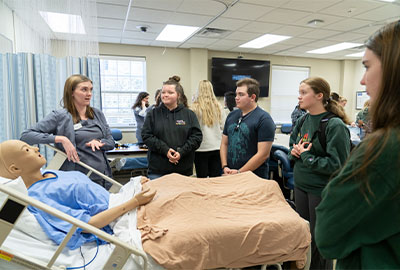Are you trying to decide which college is right for you? Many high school students debate the advantages and disadvantages of a two-year versus a four-year school. While both experiences bring unique value to the table, there's a compelling case for what a four-year college can provide. If you or your family have questions about the return on investment of a four-year commitment, keep reading. While college might not be the right path for everyone, here are the top reasons why many students commit to a four-year college.
1. Higher Earning Potential
A common thought when choosing a college is whether it’s worth the cost. Research continues to show that it is! Graduates with a four-year degree make more money than those with a two-year degree or a high school diploma. In fact, the National Center for Education Statistics suggests that, on average, people with a bachelor's degree make about 37% more than those with an associate degree.
That's a big difference, and it’s not just some groups that benefit. If you complete a four-year degree, regardless of gender or ethnicity, the pattern of earning more money holds true. Over a lifetime, with inflation and raises, this difference could easily amount to over a million-dollar difference in earnings.
Of course, what you choose to study and the debt you take on will play a role in the equation. But if you finish a four-year degree, you'll set yourself up for better pay and more job security, especially when the economy is unstable. Historically, those with a bachelor’s degree experienced a lower unemployment rate than those with only an associate degree. Most recently, this was true in 2020 when the unemployment rate tripled in the U.S.
2. Personal and Professional Development
Arguably, one of the best parts of college is the opportunity to learn more about yourself and your interests and to find the right career path. In fact, when many people get to college, they discover there are jobs and specialties they never even knew existed. College also provides exposure to diverse perspectives, cultures and concepts. You meet students from different backgrounds and engage in new ideas, broadening your horizons. When pursuing an associate degree, students are frequently on a stricter timetable to pursue a specific career trajectory such as criminal justice or nursing. Because of this, there is often less room for trying new things or taking courses focused on discovery.
But even those who have a clear career goal starting college can benefit from the interpersonal skill development and intensive mastery that a four-year college offers. For example, at Berry College, nursing students must complete two years of liberal arts curriculum before they apply to the nursing program.

Carolyn Rielly, director of the division of nursing at Berry explains, “The most appropriate course of undergraduate nursing education is a liberal arts education. Nurses need to be well-rounded, and a four-year liberal arts education provides this background. In these first years, nursing students receive the prerequisites they need like anatomy, physiology, nutrition, psychology and microbiology.”
Others in the field note that communication and writing courses give nursing students confidence in their bedside manner and ability to clearly advise patients and families about their care. Classes like economics, psychology, sociology and political science grow critical thinkers and strong problem-solvers before students focus solely on nursing content. In other words, the opportunity for more personal development sets students up to be curious, lifelong learners.
3. More Course Options, Degrees, Networks and Resources
In general, there are also more major and minor options at four-year colleges, meaning more career avenues to choose from. Four-year colleges also hire more professors or clinical experts with higher levels of knowledge and broad networks within their field. Beyond professors, four-year colleges have more alumni and a wider reach for internships. They also offer access to significant resources on campus including libraries, research facilities, technology and more. The support systems for students in areas like academic success and career development also tend to be more robust.
Beyond the traditional classroom, four-year institutions have more connections, funding and programming available for both research and study abroad. So, if these are high-priority activities as you consider a college, make sure to look at the options at the schools you are considering.

4. Emphasis on Student Life
A two-year college offers benefits for students who need flexibility, but a four-year college is often a good fit for those who want to build community and strong friendships in college. Four-year colleges have stronger school traditions with more focus on helping students find a sense of belonging. They also offer more organized student life opportunities such as more campus housing, campus sports, service organizations, clubs and social engagements.
Know Your Priorities
In the end, consider your main priorities for college. In addition to strong academics, are you looking for a place that will connect you to professional development opportunities and a strong alumni network? What about campus work opportunities that give you transferable skills? Where will you live? How will you get around? What are the dining options? As you list out your expectations, your decision-making process will become much clearer. Your preferences and goals will ultimately drive which college experience is right for you. And if you are looking for a place that will help you discover and cultivate your interests in a connected community of learners, a four-year institution will likely be your best bet.
Want to learn more about the college application process? Check out our blog, College Admissions 101: A Survival Guide to the Application Process.



